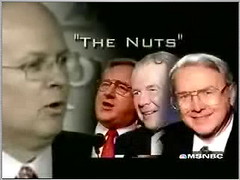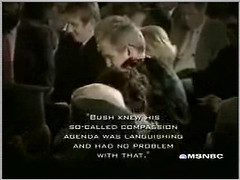Damning
Keith Olbermann is doing a multi-part preview this week on Countdown of the new book Tempting Faith by David Kuo -- the former second-in-command of the White House Office of Faith-Based and Community Initiatives (official name). And if the Republicans had worries about whether L'Affair Foley (and the ongoing shenanigans at Hastert's Haus) would turn off evangelicals from voting on the fast-approaching election day, they've got even more worries now.
First, a little reminder of formation of this office, via this WaPo article from back in late August noting its new director, Jay F. Hein:
Coincidentally, Hein's first week on the job was the 10th anniversary of "Charitable Choice," a key predecessor of the faith-based initiative. On Aug. 22, 1996, President Bill Clinton signed a bill designed to "end welfare as we know it" by, among other things, allowing states to use federal funds to pay religious groups to provide social services.
From the start, Charitable Choice was seen as a way to broaden the services available to single mothers, the homeless and impoverished elderly people. But it was also controversial on church-state grounds, particularly because it allowed government-funded groups to hire and fire employees on the basis of religion.
During his first campaign for president, Bush promised to unleash "armies of compassion" by extending a charitable tax deduction to the 70 percent of taxpayers who do not itemize their deductions. After taking office in 2001, he pushed other tax cuts through Congress but met resistance over his efforts to apply Charitable Choice to all federal social spending. In the end, Bush issued executive orders to put the faith-based initiative into effect administratively, dropping his plan for major tax breaks to spur charitable giving.
One result, according to a study by the independent Roundtable on Religion and Social Welfare Policy, is that government grants to religious charities are rising, but grants to charities overall have been squeezed.
Another result, according to former administration officials, is that the office Hein occupies has become more of a coordinator of existing executive branch activities than a producer of bold new policies and legislation.
The first director of the office, John DiIulio, was most famous for coining the phrase "Mayberry Machiavellis," as noted in this NYTimes article from December 2002 (fully available with a Times Select subscription):
In an interview with Esquire magazine, Mr. DiIulio said: "There is no precedent in any modern White House for what is going on in this one: a complete lack of a policy apparatus. What you've got is everything, and I mean everything, being run by the political arm. It's the reign of the Mayberry Machiavellis."
"Mayberry Machiavellis" is Mr. DiIulio's term for the political staff and most particularly Karl Rove, Mr. Bush's chief adviser. He describes Mr. Rove as "enormously powerful, maybe the single most powerful person in the modern, post-Hoover era ever to occupy a political-adviser post near the Oval Office."
[...]
"There is a virtual absence as yet of any policy accomplishments that might, to a fair-minded nonpartisan, count as the flesh on the bones of so-called compassionate conservatism," he says. What there is, he says, is "on-the-fly policy-making by speechmaking."
So DiIulio didn't leave happy, and neither did Kuo. Here's an article from the WaPo back in mid-February 2005:
David Kuo, who was deputy director of the White House Office of Faith-Based and Community Initiatives for much of Bush's first term, said in published remarks that the White House reaped political benefits from the president's promise to help religious organizations win taxpayer funding to care for "the least, the last and the lost" in the United States. But he wrote: "There was minimal senior White House commitment to the faith-based agenda."
Analyzing Bush's failure to secure $8 billion in promised funding for the faith-based initiative during his first term, Kuo said there was "snoring indifference" among Republicans and "knee-jerk opposition" among Democrats in Congress.
"Capitol Hill gridlock could have been smashed by minimal West Wing effort," Kuo wrote on Beliefnet.com, a Web site on religion. "No administration since [Lyndon B. Johnson's] has had a more successful legislative record than this one. From tax cuts to Medicare, the White House gets what the White House really wants. It never really wanted the 'poor people stuff.'"
And so back to Keith's preview of the book. Crooks and Liars has the video up (in both QuickTime and WMV) as well as the full transcript from the segment. This is must-see TV, so I recommend taking a few minutes to download. Here area few tidbits to get you ready while you wait:
According to Kuo, Karl Rove's office referred to evangelical leaders as 'the nuts.'
Kuo says, 'National Christian leaders received hugs and smiles in person and then were dismissed behind their backs and described as 'ridiculous,' 'out of control,' and just plain 'goofy.' "
So how does the Bush White House keep 'the nuts' turning out at the polls?
One way, regular conference calls with groups led by Pat Robertson, James Dobson, Ted Haggard, and radio hosts like Michael Reagan.
Kuo says, "Participants were asked to talk to their people about whatever issue was pending. Advice was solicited [but] that advice rarely went much further than the conference call. [T]he true purpose of these calls was to keep prominent social conservatives and their groups or audiences happy."
[...]
The Office was also, literally, a taxpayer-funded part of the Republican campaign machinery.
In 2002, Kuo says the office decided to "hold roundtable events for threatened incumbents with faith and community leaders … using the aura of our White House power to get a diverse group of faith and community leaders to a 'nonpartisan' event discussing how best to help poor people in their area."
White House Political Affairs director Ken Mehlman "loved the idea and gave us our marching orders. There were twenty targets." Including Saxby Chambliss in Georgia and John Shimkus in Illinois.
Mehlman devised a cover-up for the operation. He told Kuo, "It can't come from the campaigns. That would make it look too political. It needs to come from the congressional offices. We'll take care of that by having our guys call the office to request the visit."
This seems to confirm what Tucker Carlson said earlier this week (with video also available at Crooks and Liars):
CARLSON: It goes deeper than that though. The deep truth is that the elites in the Republican Party have pure contempt for the evangelicals who put their party in power. Everybody in…
MATTHEWS: How do you know that? How do you know that?
CARLSON: Because I know them. Because I grew up with them. Because I live with them. They live on my street. Because I live in Washington, and I know that everybody in our world has contempt for the evangelicals. And the evangelicals know that, and they're beginning to learn that their own leaders sort of look askance at them and don't share their values.
I'm looking forward to the next segment on Kuo's book tomorrow night. In the meantime, it looks like Mrs. F and I have found a great book to gift a few of our conservative Christian loved ones to prove to them once and for all that the faith they've put into the BushCo Admin LLC to promote Christian family values has been trampled upon. (I'm sure Old Fogey -- Mrs. F's Mom -- might have more to add to this from her liberal Christian standpoint.)




0 Comments:
Post a Comment
<< Home